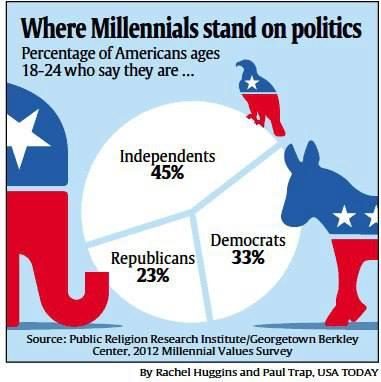According to recent studies, around 45 percent of millennials are now politically unaffiliated or independent.
With birthdays spanning between the early 1980s and the early 2000s, millennials have long been criticized for their divergence from their predecessors when it comes to values like work ethic, political activity, and sense of civic engagement. Criticism is rooted in the behavioral tendencies of America's younger generation of voters - the future generation - to demand immediacy in all aspects of their lives.
When it comes to information, the Internet has provided this generation with a vast amount of information readily available with the click of a button. When it comes to career paths, the advancement of technology has opened up a world of opportunity and a creative space that was unheard of in previous generations. And when it comes to politics, millennials want results - and they want them now.
 45% of Millennials aged 18-24 now identify themselves as independent voters
45% of Millennials aged 18-24 now identify themselves as independent voters
However, when it comes to public service, millennials have grown up with an appreciation for community service, one that expands beyond the hours required by high school administrators and college admission offices.
Despite being described as "lazy, entitled narcissists," a 2012 study reveals that close to 75 percent of millennials gave to a charity in 2011 and two-thirds volunteered for a cause.
They are committed to public service and motivated by social change.
Growing up in the age of Internet and iPhones, millennials have a unique understanding of the changing digital needs of society -- something lacking in the majority of current lawmakers today.
In a time when dissatisfaction among the two political parties is high, it would seemingly follow that young professionals would be eager to transform Washington's outdated ideology and replace it with one that acknowledges the ever-changing landscape of diversity, morality, and technology that governs life in America today.
The partisan nature of politics today, however, has created an environment so unwelcoming that even the civically aware millennials are keeping a distance.
Instead of applying their much-needed digital skills to the fight for a more representative government, these 20-something year olds are serving elsewhere. They are turning to the private sector or nonprofit work to fulfill their quest for social change.
John Della Volpe, director of polling at Harvard’s IOP, explains why:
"Millennials, born between 1982-2003, have never been exposed to the type of politics that warrants idolization. Their initial exposure to politics was not rich with political compromise and problem solving, rather it was during the age of government distrust we still find our political system struggling with," Della Volpe explains in a recent Atlantic article.“They came of age in a period of polarization and gridlock…The president they supported could not overcome it,” he continues, speaking of President Obama.
While partisanship dates back to our Founding Fathers, what differentiates today's partisanship to that plaguing Jefferson's era is our immediate access to it. Social media, cable television, online forums, blogs etc... have created an environment overflowing with different viewpoints and political ideologies.
And while the diversity of opinions is something to be celebrated, the exponential increase in competing ideas and spread of partisan attacks in the mainstream media has led the majority of bright-eyed millennials to agree that "politics has become too partisan." Glued to their phones and Twitter feeds, this is what they have now come to associated politics with.
With nearly one-third of our future generation of leaders agreeing that “political involvement rarely has any tangible results,” what does this mean for the future of Washington?
